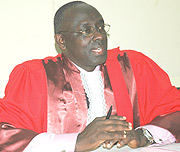High Court president Johnston Busingye yesterday castigated judicial practitioners who undermine their duty of promoting and respecting the Rule of Law and Human Rights in Rwanda.


High Court president Johnston Busingye yesterday castigated judicial practitioners who undermine their duty of promoting and respecting the Rule of Law and Human Rights in Rwanda.
After revealing the achievements registered by the sector last year, Busingye reminded the jurists that their services should be simple, transparent, and on time.
"The nature of our service is sensitive…it can be compared to the set up of a hospital where a doctor saves lives, since it has lasting impact on the people,” Busingye said in a meeting that brought together judges, lawyers and court clerks from different parts of the country.
"We are major stakeholders in national integrity as this is our first and foremost duty, others can only come in to supplement us,” Busingye told the meeting that brought together over 500 participants at Hotel Le Printemps in Kimironko.
The meeting was aimed at urging stakeholders to invest in Judicial Integrity by fighting corruption, economic and human rights crimes as the New Year sets in.
"Our aim this year should be promptly filing and dealing with cases professionally and on time in respect to the procedural law,” said Busingye.
He added: "Service is commitment to success and the process in our line of work demands a lot because the results can only be as good as the process.”
"In reality and perception, even in times of stress, that extra minute of courtesy and care to a litigant can make a world of difference to perception, so we should prevail no matter what,” he advised.
According to Busingye, the bottom line is to achieve the set goals otherwise there would be no point in serving.
Charles Kariwabo from the inspectorate of courts challenged participants to go by their code of conduct and avoid any irregularities that may tarnish the name of the institution.
"We should find pride in helping the local people access justice, and if possible, mobilize for alternative measures of dispute resolution,” Kariwabo said.
He pointed out that the historical obligation judges owe to litigants, themselves, and the country, ought to be of incorruptibility, impartiality and independence.
Ends


